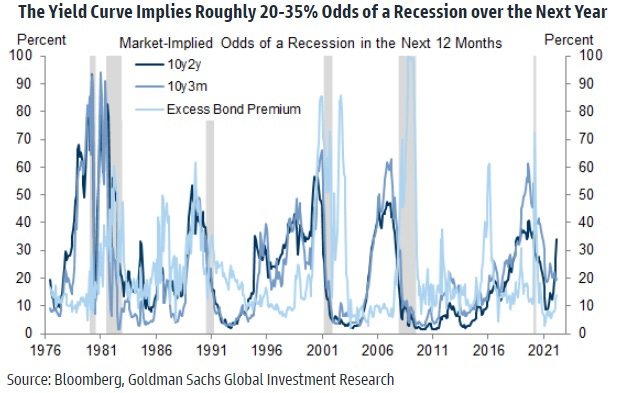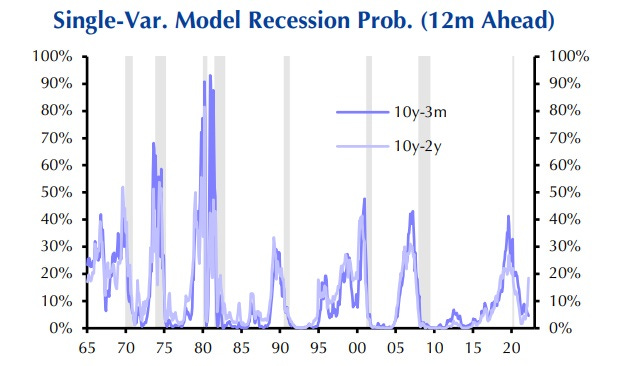🤔 Vladimir Putin (and some US conservatives) call America 'decadent.' Really?
Also: With the Fed now raising rates, another look at the odds of a US recession
🤔 Vladimir Putin (and some US conservatives) call America 'decadent.' Really?
Two recent Faster, Please! essays — “Is this really America's age of 'anti-ambition' and decadence?” and “A country without a positive vision of the future has no future. Just look at Russia” seem worth updating given recent international events. Let’s start with a few recent global headlines and quotes:
“Putin is betting that the West is too decadent to defend its values” - The Guardian
“Russia says its special military operation is going to plan and that despite sanctions it can fare well without what it casts as a deceitful and decadent West led by the United States.” - Reuters
“Putin's culture war against an 'increasingly decadent West'” - ABC
“The idea of the decadent, snowflake, cancel-culture-obsessed West —contrasted with the traditional values of Mother Russia and its strongman leader — has become a staple of Kremlin propaganda.” - The Atlantic
See what I did there? And while those are all recent headlines and quotes, there’s nothing new to the “decadence”- focused framing that they highlight. Back in 2013, Vladimir Putin partially defined the “independent path” being taken by Russia by contrasting its “traditional” values versus the “liberal” values of the West — with the latter leading into “chaotic darkness and a return to a primitive state.” From a speech in December of that year:
We know that there are more and more people in the world who support our position on defending traditional values that have made up the spiritual and moral foundation of civilization in every nation for thousands of years: the values of traditional families, real human life, including religious life, not just material existence but also spirituality, the values of humanism and global diversity.
Russians framing the West as decadent precedes Putin, of course, with the claim being a staple of Soviet propaganda — though the focus then was more about materialism rather than morals. But after the Cold War, however, the charge seems anachronistic and ham-handed as propaganda. Even on its own terms, the charge doesn’t work — unless all that Putin quote means is that the Russian government will persecute LGBT Russians.
For example: Compared to America, Russia has a lower birth rate, higher abortion rate, and lower church attendance — presumably key decadence metrics to conservative Christians in the US who might be sympathetic to the decadence claim. And as I note in the piece of Russian pessimism, a 2019 poll of young Muscovites finds that they imagine their lives on only a roughly two-year time horizon and have little hope for the economy and a well-governed nation.
In many ways, Russia just can’t seem to put it all together: Despite vast natural resources, a well-educated population, a deep scientific base, and an economy long freed from the heavy shackles of communist central planning, Russian income has fallen further behind the West. It possesses a political economy where “corruption and impunity are pervasive.” No wonder Russia tops The Economist’s crony capitalist index vs 17th for the United States:
But it’s not just Putin calling America decadent. The accusation also comes from the populist right in the US, as well as from some traditional conservatives such as New York Times columnist Ross Douthat, author of the 2019 book The Decadent Society: How We Became the Victims of Our Own Success. The former echo many of Putin’s views with an anti-globalization twist, while the latter highlights a portfolio of issues — from economic stagnation to the opioid epidemic to Trump-era political grifting. So a few points here:
First, even the back-of-the envelope calculation suggests Russia has no place to call America decadent. I mean, please.
Second, (and this is a point I made previously), I don’t think what’s been happening economically is a decadence issue. America’s productivity and tech progress downshift since the early 1970s occurred despite considerable effort from Washington. As I wrote: “President after president, decade after decade, has highlighted anemic or declining productivity growth as a pressing national concern. But their responses were hindered by the surprise start of the slowdown, ignorance of its causes, and an underestimation of its severity. They simply failed to meet the scope of the challenge, whether they involved cutting taxes, increasing spending on new research programs from time to time, or announcing big ideas — like Jimmy Carter and his clean energy plan or George W. Bush and his initiatives for hydrogen fuel and nanotechnology.”
Third, dictators always underestimate the ferocity and fight in a free people trying to stay free. Adolf Hitler made this mistake, and now Putin. It’s also worth noting that the Russian military seems to be disintegrating after a few weeks while the American military has been fighting almost non-stop throughout the 21st century. So who’s decadent?
Finally, none of this is to say America can’t do better. That’s the main point of this newsletter: to identify and advocate pro-progress policies and support a pro-progress culture so we can create and build a better world.\
💸 With the Fed now raising rates, another look at the odds of a US recession
Item: “The Federal Reserve on Wednesday approved its first interest rate increase in more than three years, an incremental salvo to address spiraling inflation without torpedoing economic growth. After keeping its benchmark interest rate anchored near zero since the beginning of the Covid pandemic, the policymaking Federal Open Market Committee said it will raise rates by a quarter percentage point, or 25 basis points. That will bring the rate now into a range of 0.25%-0.5%. … Along with the rate hikes, the committee also penciled in increases at each of the six remaining meetings this year, pointing to a consensus funds rate of 1.9% by year’s end. (CNBC, March 13, 2022)
In Monday’s issue, I highlighted several charts suggesting some uncomfortably high odds of the US economy falling into a recession. Here are a few of those charts:
To those, let me add these two bullish charts from economic consultancy Capital Economics. The first chart shows that the 10 year-2 year spread is now just 30 basis points, “putting the implied probability of a recession within the next 12 months at close to 20%.” But the 10 year-3 month spread, also pictured, “which historically has been a slightly more accurate recession signal, remains above 150bp, which translates into a 5% recession probability.”
This second CE chart shows a composite recession tracking model, which incorporates “a broad range of economic and financial market data, currently puts the odds of a recession within the next year at just 2%.”
Over the next year or so, we’ll see how things play out. But as I wrote previously: “A recession for whatever reason so soon after the economic shock from the pandemic — not to mention all the optimistic talk about a New Roaring Twenties — would be a real stomach punch.” It doesn’t preclude a New Roaring Twenties, but I would prefer this decade kick into gear ASAP. Or, you know, faster, please!








